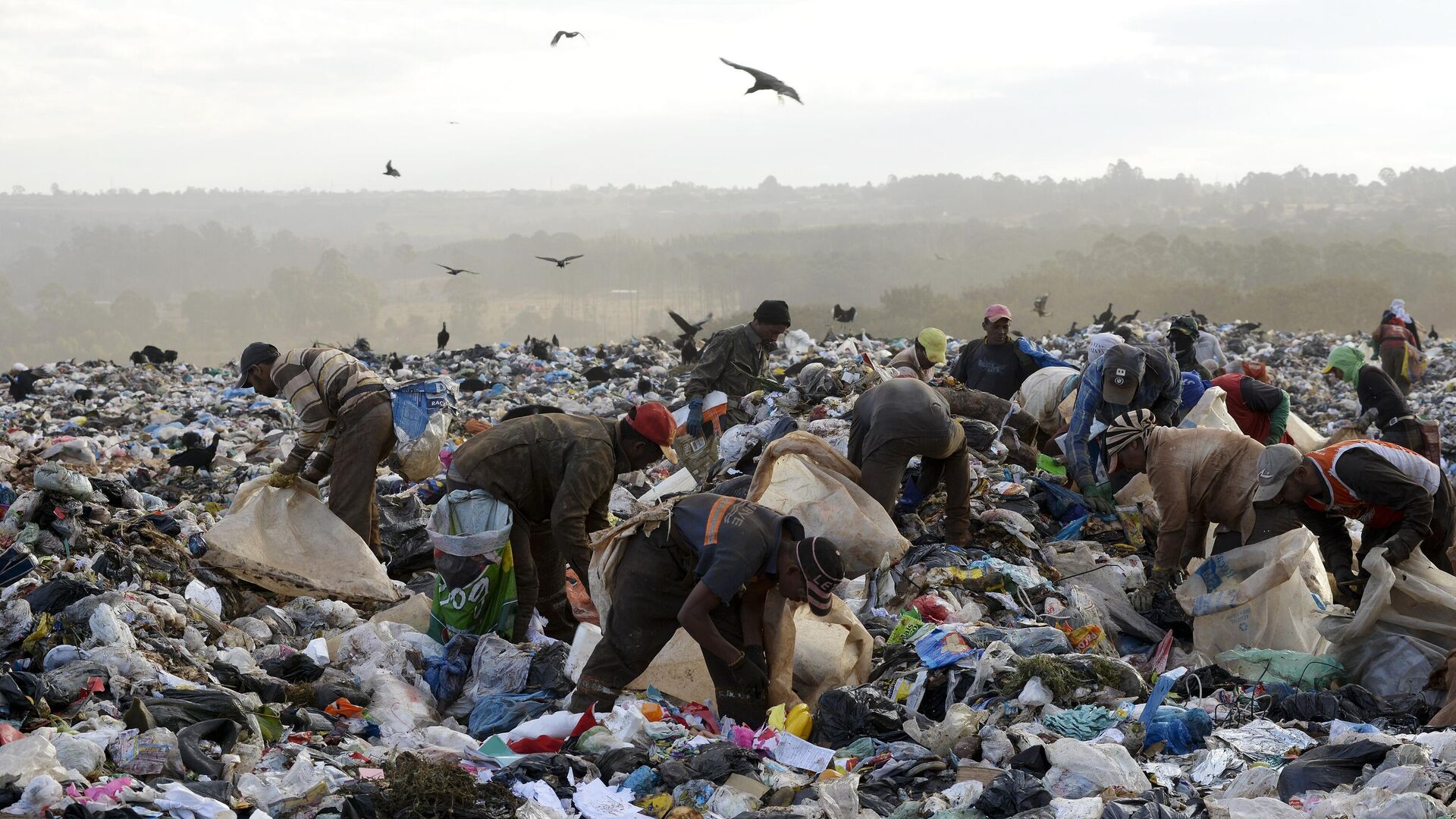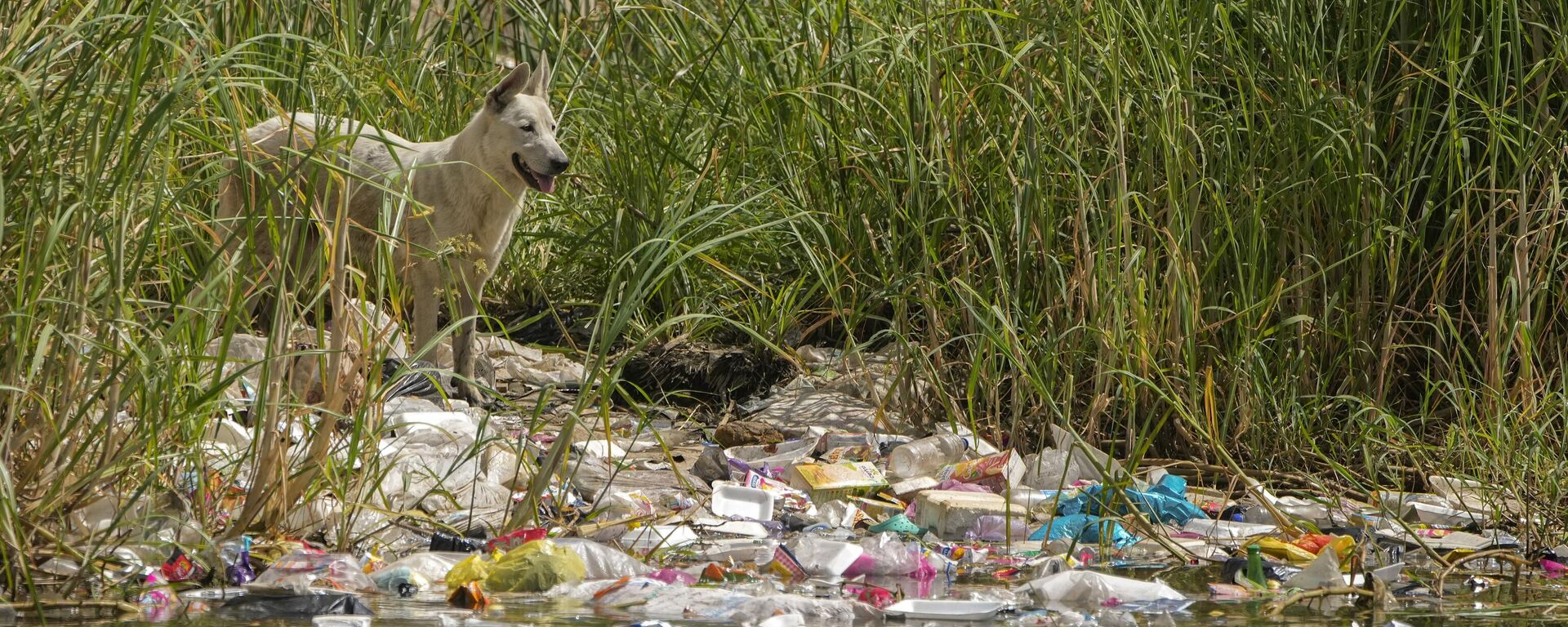https://en.sputniknews.africa/20231110/life-in-plastic-not-so-fantastic-activist-reveals-ways-to-reduce-plastic-waste-in-africa-1063455102.html
Life in Plastic Not Fantastic: Activist Reveals Ways to Reduce Plastic Waste in Africa
Life in Plastic Not Fantastic: Activist Reveals Ways to Reduce Plastic Waste in Africa
Sputnik Africa
On Wednesday, the UK-based Christian charity Tearfund revealed that enough plastic is thrown away or burned every minute in sub-Saharan Africa to fill a... 10.11.2023, Sputnik Africa
2023-11-10T18:10+0100
2023-11-10T18:10+0100
2023-11-10T18:11+0100
opinion
environment
nigeria
south africa
kenya
east africa
southern africa
west africa
climate
pollution
https://cdn1.img.sputniknews.africa/img/07e7/0b/0a/1063458935_0:161:3068:1887_1920x0_80_0_0_d5659207673431da1621811c3546d508.jpg
Reducing the amount of plastic waste in Africa will require a concerted effort by plastic consumers, plastic manufacturers, governments, and the private sector, Manqoba Dlamini, Chief Executive Officer at Green Prince Foundation, told Sputnik Africa.On the consumer side, the activist proposed that polluters should be fined in proportion to the damage they cause to the environment, which will minimize the accumulation of waste and its management. In addition, the activist noted the need to encourage recycling initiatives in local communities and raise awareness about the way plastic is being wasted. The need for awareness stems from the fact that locals do not realize that the plastic they consume ends up in the marine ecosystem, but they simply use it because it is convenient to use and cheaper, Dlamini stressed.According to him, the consumption habits in Africa today underestimate the importance of waste management. Tackling plastic pollution also requires government action to regulate plastic manufacturers through extended manufacturer responsibility schemes, the activist emphasized. He added that "a great work" is being done in this direction in Nigeria, South Africa and Kenya, which should be emulated by other African countries.The activist also urged the government to play a role in another plastic-related concern - the safety of waste collectors. According to Dlamini, waste collectors need to be provided with the necessary personal protective equipment and disposal sites need to be properly maintained to ensure that wastes are disposed in a "clean and proper" manner without posing a risk to the workers.According to an OECD 2022 report, sub-Saharan Africa produced just over 16 million tons of plastic waste in 2019, and that figure will rise to nearly 94 million tons by 2060. Among other plastic-emitting countries in 2060, the report cited India (128 million tons), the US (141), and China (182). Overall, global plastic use is projected to nearly triple in 47 years (from 353 million tons in 2019 to 1 billion tons in 2060).According to an OECD 2022 report, sub-Saharan Africa produced slightly more than 16 million tonnes of plastic waste in 2019, and that figure is expected to rise to nearly 94 million tonnes by 2060. Among other plastic-emitting countries by 2060, the report cites India (128 million tonnes), the US (141), and China (182). Overall, global plastic use is projected to reach nearly triple in the next 47 years (from 353 million tonnes in 2019 to 1 billion tonnes in 2060).The global community will also be focusing on this issue in Kenya next week: From November 13-19, Nairobi will be hosting the third session of the UN Intergovernmental Negotiating Committee to develop an international legally binding instrument on plastic pollution.
https://en.sputniknews.africa/20231108/plastic-junk-piles-high-as-africa-polluted-with-football-field-sized-waste-each-minute-1063405185.html
nigeria
south africa
kenya
east africa
southern africa
west africa
Sputnik Africa
feedback@sputniknews.com
+74956456601
MIA „Rossiya Segodnya“
2023
Maxim Grishenkin
https://cdn1.img.sputniknews.africa/img/07e7/0a/17/1063018107_0:0:1104:1103_100x100_80_0_0_03090c85a11f5d2e8a19cf1d989443c9.jpg
Maxim Grishenkin
https://cdn1.img.sputniknews.africa/img/07e7/0a/17/1063018107_0:0:1104:1103_100x100_80_0_0_03090c85a11f5d2e8a19cf1d989443c9.jpg
News
en_EN
Sputnik Africa
feedback@sputniknews.com
+74956456601
MIA „Rossiya Segodnya“
Sputnik Africa
feedback@sputniknews.com
+74956456601
MIA „Rossiya Segodnya“
Maxim Grishenkin
https://cdn1.img.sputniknews.africa/img/07e7/0a/17/1063018107_0:0:1104:1103_100x100_80_0_0_03090c85a11f5d2e8a19cf1d989443c9.jpg
environment, nigeria, south africa, kenya, east africa, southern africa, west africa, climate, pollution
environment, nigeria, south africa, kenya, east africa, southern africa, west africa, climate, pollution
Life in Plastic Not Fantastic: Activist Reveals Ways to Reduce Plastic Waste in Africa
18:10 10.11.2023 (Updated: 18:11 10.11.2023) On Wednesday, the UK-based Christian charity Tearfund revealed that enough plastic is thrown away or burned every minute in sub-Saharan Africa to fill a football field. Neither is last year's OECD report encouraging: by 2060, the region will have six times more plastic waste than in 2019.
Reducing the amount of plastic waste in Africa will require a concerted effort by plastic consumers, plastic manufacturers, governments, and the private sector, Manqoba Dlamini, Chief Executive Officer at Green Prince Foundation, told Sputnik Africa.
"We need to work with governments, inter-governmental committees, the private sector and the community to bring together the scope of expertise and make sure that we have a committed buy-in in Africa," he said.
On the consumer side, the activist proposed that polluters should be fined in proportion to the damage they cause to the environment, which will minimize the accumulation of waste and its management.
In addition, the activist noted the need to encourage recycling initiatives in
local communities and raise awareness about the way plastic is being wasted. The need for awareness stems from the fact that locals do not realize that the plastic they consume ends up in the marine ecosystem, but they simply use it because it is convenient to use and cheaper, Dlamini stressed.
According to him, the consumption habits in Africa today underestimate the importance of waste management.
"We have been using plastics in Africa all over like there has never really been a need to look at the issues of recycling or of minimizing waste," Dlamini opined, adding that this downplaying is due to the higher priority given to food and water security issues.
Tackling plastic pollution also requires government action
to regulate plastic manufacturers through extended manufacturer responsibility schemes, the activist emphasized. He added that "a great work" is being done in this direction in Nigeria, South Africa and Kenya, which should be emulated by other African countries.
The activist also urged the government to play a role in another plastic-related concern - the safety of waste collectors. According to Dlamini, waste collectors need to be provided with the necessary personal protective equipment and disposal sites need to be properly maintained to ensure that wastes are disposed in a "clean and proper" manner without posing a risk to the workers.
"We need governments to come on board in terms of policy and governance and enforcement of those policies to make sure that they work at the level where the waste pickers are involved. And also just having an awareness workshop for the waste pickers themselves so that they know their rights, they know what they are exposed to," the activist remarked.
According to an OECD 2022 report, sub-Saharan Africa produced just over 16 million tons of plastic waste in 2019, and that figure will rise to nearly 94 million tons by 2060. Among other plastic-emitting countries in 2060, the report cited India (128 million tons),
the US (141), and China (182). Overall, global plastic use is projected to nearly triple in 47 years (from 353 million tons in 2019 to 1 billion tons in 2060).
According to an OECD 2022 report, sub-Saharan Africa produced slightly more than 16 million tonnes of plastic waste in 2019, and that figure is expected to rise to nearly 94 million tonnes by 2060. Among other plastic-emitting countries by 2060, the report cites India (128 million tonnes),
the US (141), and China (182). Overall, global plastic use is projected to reach nearly triple in the next 47 years (from 353 million tonnes in 2019 to 1 billion tonnes in 2060).
The global community will also be focusing on this issue in Kenya next week: From November 13-19, Nairobi will be hosting the third session of the UN Intergovernmental Negotiating Committee to develop an international legally binding instrument on plastic pollution.



